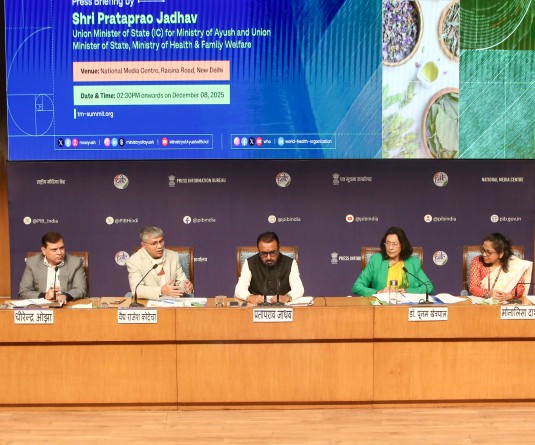IANS File Photo

New Delhi, September 23 (PTI): Colorectal cancer cases among young adults have been increasing over the last two decades, and the Covid pandemic has worsened the plight of patients suffering from this ailment, a leading private healthcare group said on Thursday.
Doctors at a hospital run by the Apollo Healthcare said delay in screening when symptoms show up also aggravates these cases, and during the pandemic many patients' ailments moved into advanced stages as they stayed at home.
Colorectal cancer starts in the colon or the rectum.
"The rate of colorectal cancer has been increasing among young adults in their 20s to 40s over the last two decades. This is an age when people are active, building families and careers and it is important to ensure quality of life for these patients after treatment.
"However, colorectal cancer if identified in the early stages can be completely cured and robotic colorectal surgery helps patients avoid colostomy and lead a normal life," the healthcare group said in a statement.
The Apollo Institute of Colorectal Surgery in Chennai on Thursday marked completion of its five years, and held an event, both offline and online, during which some of the patients who have undergone surgery for colorectal cancer also shared their experiences.
Among the people who have benefitted from this unit is a 28-years-old post-graduate medical student who had successfully undergone robotic colorectal surgery for low rectal cancer, and went on to complete her higher education and won a gold medal, the Apollo Healthcare group said.
The unit offers cutting-edge minimally invasive robotic surgical techniques and technology in the treatment of patients with colorectal diseases, especially colorectal cancer, it said.
Dr. Venkatesh Munikrishnan, consultant colorectal and robotic surgeon, at the Apollo Institute of Colorectal Surgery, said, "She was diagnosed with very low rectal cancer in 2017 when she was 24 years of age, just as she was about to join her medical post-graduation.
"It was a shock to her as she expected that even with treatment, her medical dreams would come to an abrupt halt. This is because conventional surgery for colorectal cancer leaves patients with a colostomy, i.e., a surgically created opening in the body that routes bowel waste away into an external colostomy bag."
He said with robotic colorectal surgery, the doctors were able to perform the complex surgery to remove the cancer and reconstruct the colon to rectal or anal connection, thus avoiding a permanent colostomy.
"She had an uneventful recovery, went on to finish her course and excelled, getting the gold medal. The use of robotic surgery also has several short-term benefits, such as less blood loss, quicker recovery, and better maintenance of normal bodily function, he said.
The doctor also said consumption of unhealthy food, packaged food and red meat a lot can make a person predisposed to this ailment, and also advised other direct family members to get screened too, if a member has been diagnosed with the disease, as in a son or daughter should get screened if a parent has been diagnosed with colorectal cancer.
"The World Bank had put the spotlight on the huge impending crisis from non-communicable diseases in the decade ahead and the impact on individuals, families and the nation. Cancers in particular are taking a big toll and colorectal cancers are showing a rise, thus becoming a major threat.
"At Apollo, we are bringing in cutting-edge medical technology, representing the next era of healthcare innovation to treat cancers," the statement quoting Dr. Prathap C Reddy, Chairman, Apollo Hospitals Group, said.
In 2016, Apollo group started a specialised department for colorectal Surgery and also simultaneously started robotic colorectal surgery. This has led to precision surgery that causes minimal side-effects in patients. The robotic colorectal surgery programme will also be extended to other hospitals in the group, he said.
"We are confident that along with early diagnosis, this will help in making a significant impact in reducing the morbidity and mortality from colorectal diseases including colorectal cancer," Reddy said.
The robotic colorectal surgery programme is one of the the busiest in the country, with over 600 robotic colorectal surgeries completed since its opening in 2016, it said.
Colorectal cancer is a common cancer globally, but has a low reported incidence in India with GLOBOCAN 2018 ranking colon cancer 13th in terms of incidence and mortality, with 27,605 new cases and 19,548 deaths annually.
Since 2018, 27,605 new cases have been registered across India and the total number of patients living with the disease in India is estimated to be around 53,700, the group claimed.
Colorectal cancer is "on the rise especially among young Asian males" with unhealthy lifestyle patterns one of the key reasons for its occurrence, it said.






